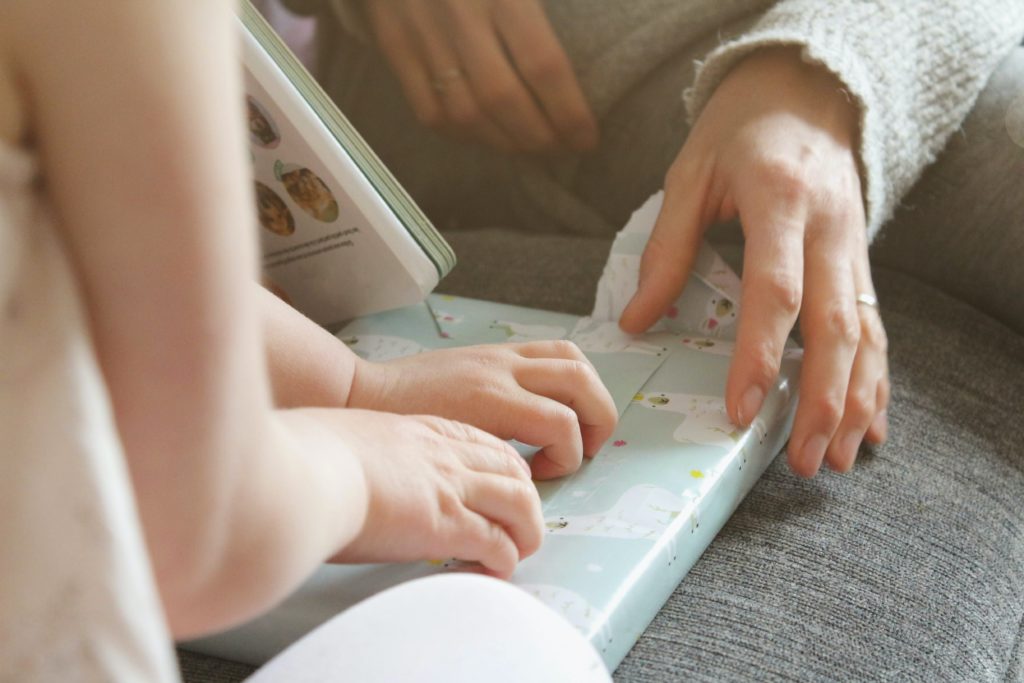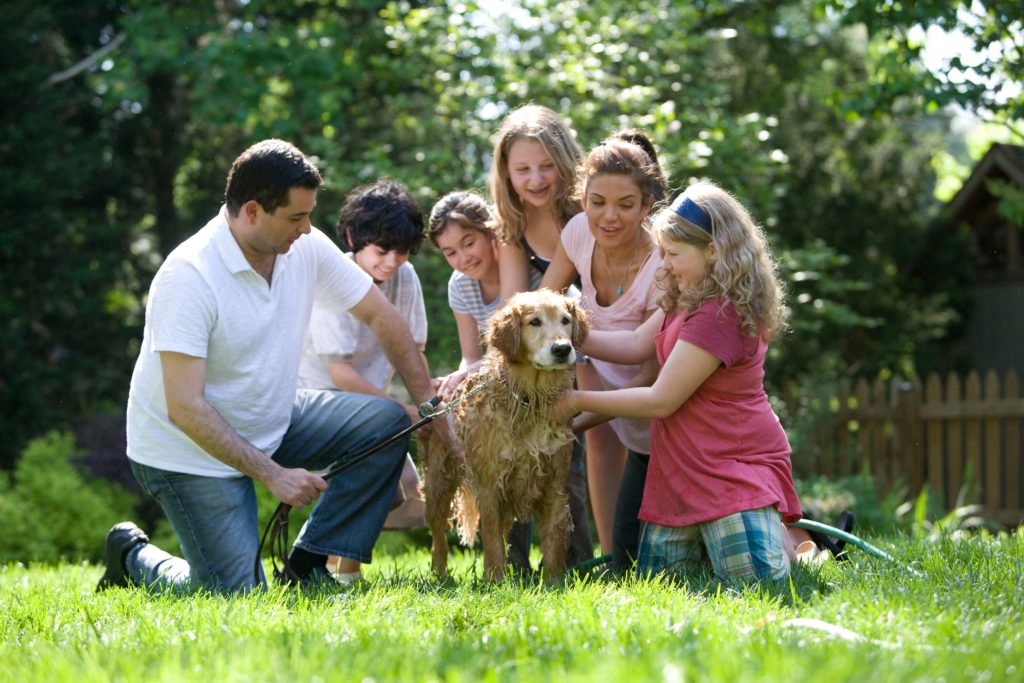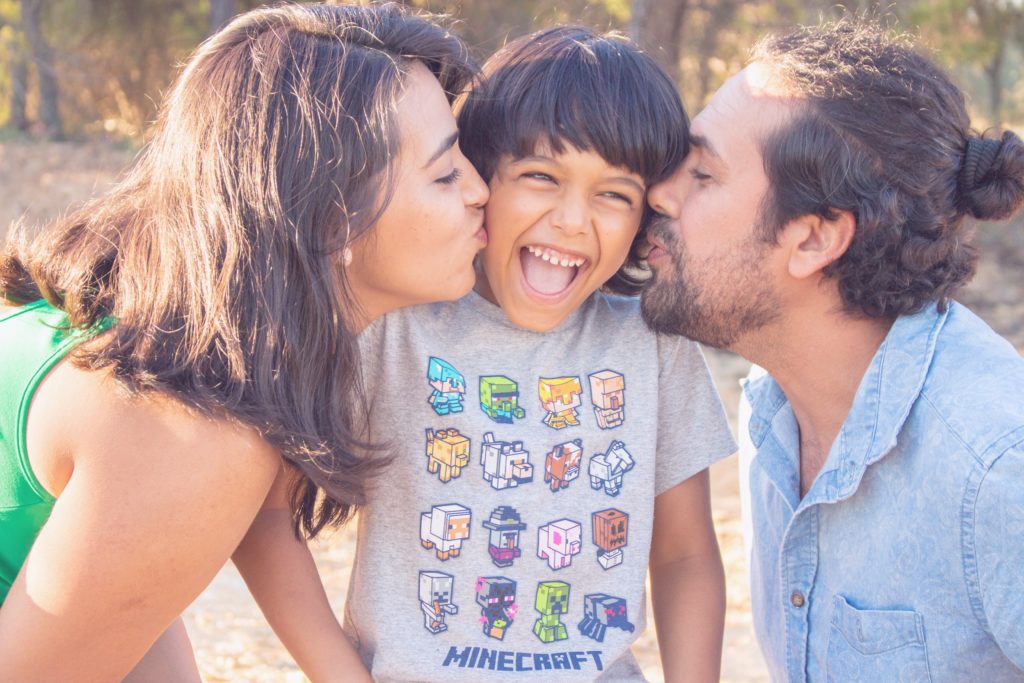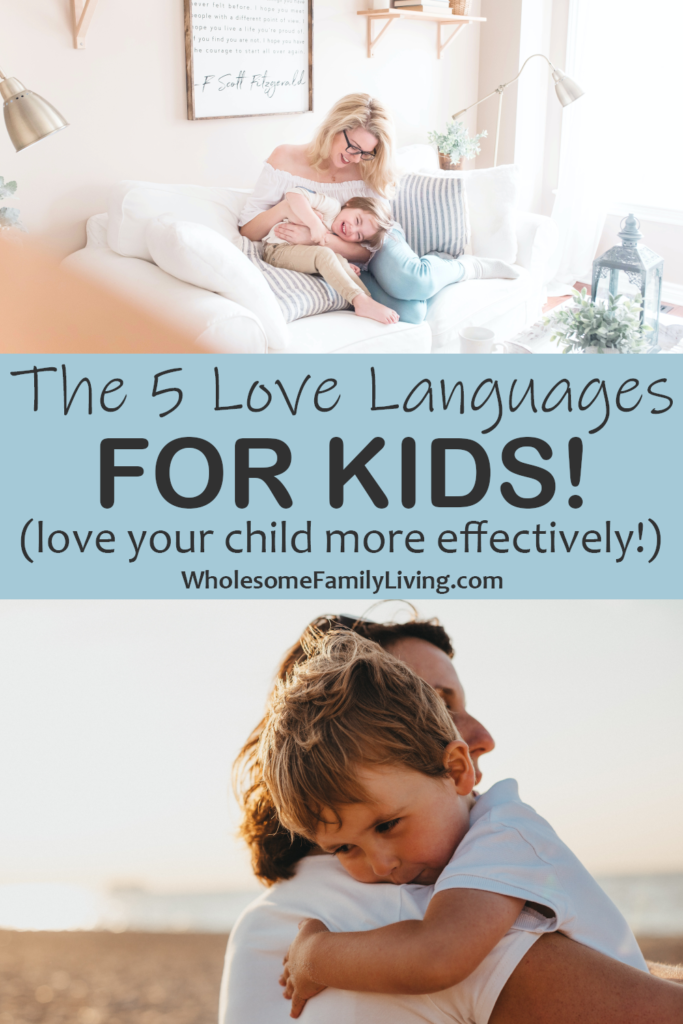Did you know that the 5 Love Languages are for kids too and not just for your marriage?
And every single person, including children, has a primary love language!
Not sure what the five love languages are?
The five love languages are quality time, physical touch, words of affirmation, gifts, and acts of service.
In a previous post, I detailed how they related to effectively showing your spouse love.
However, these five love languages are important not only for your marriage, but also for better understanding your kids.
So keep reading for a recap of the five love languages and how to then apply them to your children!

What are the 5 Love Languages and How Do They Relate to Kids?
As I mentioned above, the five love languages are quality time, physical touch, words of affirmation, gifts, and acts of service.
And of these five love languages, one of them makes each person feel loved the most.
I’m not saying that we shouldn’t work to use all five, but everyone, including your kids, has a PRIMARY love language.
This is the one love language that will fill your child’s “love tank” the most.
This is also the one love language that when it’s missing, it will drain your child’s “love tank” the most.
But let’s back up for a minute.
What does quality time or acts of service mean to your kid??
Let’s talk about each of the 5 love languages and how they relate to your children!
Quality Time
As you might have guessed, quality time is about spending TIME with your child.
There are actually two types of quality time: face-to-face and shoulder-to-shoulder.
Face-to-face quality time is when someone enjoys activities where you are engaging in conversation and making lots of eye contact.
With your kids, this could be reading books with them while you talk about the plot and characters, playing a game together, or putting down your phone for a period of time to talk to them about their day.
Shoulder-to-shoulder quality time is when someone enjoys doing hobbies or activities together where there would be less conversation involved.
The important thing is that you are together, not necessarily that you are talking to one another.
With your kids, this could include watching a movie together, being at their sporting events or a recital, or playing a video game together.

Physical Touch
Now don’t get weird on me for this one.
Yes, for marriages, this can mean sex, but just as we talked about in Your Marriage Needs the 5 Love Languages, physical touch means SO MUCH MORE!
Physical touch includes any physical interaction that you have with your kids!
For some children, they might need hugs and snuggles, which are a reassurance of your love to them.
For other children, this might mean bear wrestling on the floor and tackling each other.
Maybe it’s holding hands when you go on walks.
Just as adults need different types of physical touch, kids will also need this love language in different ways.

Words of Affirmation
Words of affirmation is using your words to boost someone’s morale or encourage them.
This can be so important for kids who are insecure and need to feel your confidence in them!
Think right before a big performance or test, your words of encouragement can help ease their nerves and help them perform well!
For some kids, knowing that you love them no matter what is also something that you can convey with your words to fill their love tank.
Other kids just want you to notice the little things about them (such as “I noticed you really liked that book, let’s read it again”).
So give praise where praise is due or give encouragement whenever possible!

Gifts
Now I know what some of you are thinking – my kid already has SO much stuff, they don’t need anything else!!
But hold on!
The love language of gifts doesn’t just mean buying your kid a new toy on every shopping trip.
A gift can be as simple as giving your child a token of your love, or showing them something that reminded you of them.
This lets them know that you were thinking of them.
Shoot, for young children, you can go pick dandelions from your yard as a bouquet of flowers for them and they will LOVE IT! (yes, I have done this, haha!)
So get creative, and instead of buying your child more toys, make them a card, write them a song, or go pick a bouquet of weeds.
Most of the time, children aren’t looking for expensive things, they just want to know that you love them and are thinking about them.

Acts of Service
Okay, I hear you.
You make dinner every day, do the laundry, drive your child to all their activities, so why does a parent need to do more “acts of service”?!
Simply put, because the acts of service you are doing now aren’t necessarily the ones that make your child feel loved.
They aren’t targeted acts of service meant to fill their love tank.
What you are counting as acts of service is probably more like your “to-do” list and everyday chores you do to keep your household running smoothly.
In order to make that deposit into your child’s love tank, the act of service needs to be directed just at them, so that they feel special and loved.
What does this even look like?
How about making them a special treat that you know is their favorite?
For my daughter, that means surprising her when she wakes up with bacon for breakfast.
Oh the smile that that puts on her face!
Or how about completing one of their “chores” for them that they are normally assigned, so that they can get extra play time?
Right now, my toddler doesn’t have assigned chores to do, but we do make her clean up her room before bedtime.
So if I wanted to do an act of service to fill up her love tank, I might help out and put things away and then offer to read an extra story before bed.

Why It’s Important to Analyze the 5 Love Languages for Your Kids
It is important to analyze the five love languages for your kids for the same reason that it’s important to know your spouse’s primary love language – so we can more effectively fill their love tank!
Our kids need our love and support as they grow up.
If we crack the code on showing them love in their primary love language, we will fill that love tank more quickly!
Have you considered that your child could be acting out because they aren’t feeling loved or because their love tank is empty?
Sure you make all their meals, keep the house clean, and drive them to all of their activities, but for most kids this isn’t putting anything into their love tank.
In fact, this could be putting a big hole in the bottom of their tank!
What I mean by that is that for a child with quality time as their primary love language, by you being busy with all of your “chores” and “to-do” list items, you are actually draining their love tank because you aren’t spending quality time with them!
So by taking the time to think through what your child’s love language is, you can prioritize activities that will help make them feel the most loved.
And just as our primary love language can change within our marriage, your child’s primary love language might change as they grow up.
So it is important to periodically reassess what you think your child’s primary love language is to make sure you are still making the right deposits!

Putting Together the Clues to Determine Your Child’s Primary Love Language
Okay, so now you know what the five love languages are and how they relate to kids.
You also know that it’s important to know your child’s primary love language.
But how do you figure it out??
If your child is older than five, have them take the online test.
If your child is younger than that, let me help show you how I determined my toddler’s love language!
Think about you child for a minute.
Which of those five categories do they seem to enjoy receiving the most?
And which category do they seem to show you the most love through?
We tend to give love in the ways that we want to receive love, so the ways in which your child shows you love are actually clues as to how they want to receive love!
Does your child always want you to come play with them when you get home from work?
Maybe their primary love language is quality time!
Does your child always want hugs and snuggles?
Maybe their primary love language is physical touch!
Does your child keep every card and gift ever given to them and can tell you who gave them each item?
Perhaps their primary love language is gifts!

How to Use the 5 Love Languages for Kids
The best way to use the five love languages for your kids is to think through each category and list out examples of how your child gives and receives love in that category.
After you have gone through all five, go back through and rank each category with a 1-5 rating of where you think it falls compared to the other categories.
Whichever category you rank as number one is going to be your best guess at your child’s primary love language.
Now go ahead and show your child love through that category for a few days and then check back in.
Did your child respond well to the love you gave this week?
By chance did they seem happier or more willing to listen and obey?
If so, you were probably making good deposits into their love tank!
Now I’m not saying that every time your child acts out that it’s because you aren’t showing them love in the right way.
Sometimes kids will be kids and they are just having a grumpy day.
Discipline and consistency are still really important and will be an important part of raising your children.
But we are looking for an overall trend to see if we are filling their love tank!

An Example of Analyzing the 5 Love Languages for My Kid!
So let me show you how I went through the list and ranked them with my toddler.
I will go through each of the five love languages first and then rank them.
Quality Time
My toddler LOVES time with me.
She always wants to have my full attention.
She wants to read books together, dance to music together, do laundry together, make dinner together, go to the park together, etc.
Quality time seems like it will rank pretty high on the list.
Physical Touch
It is actually pretty rare that my daughter wants hugs, kisses, or snuggles.
The only time she really wants a hug is when she is upset.
And she does always want me to kiss her boo-boos.
I would guess this is pretty low on the list.
Words of Affirmation
My daughter thrives under words of encouragement and praise.
I have even convinced her to do something by telling her that I will clap for her if she does it.
While clapping isn’t exactly “words”, it is a form of communication, especially to a child that isn’t speaking many words.
She also readily gives words of affirmation, like telling me I look cute or that I have a beautiful face.
I would guess this will be pretty high in the ranking.
Gifts
My daughter definitely loves new things!
She enjoys looking at new books I bring home from the library and likes playing with new toys, but she wants to do those things with you – hence why I still think quality time will rank higher on the list.
But she does love to bring me pretend and real flowers as bouquets.
And she does remember who gave her certain gifts, so this is probably in the middle of the pack somewhere.
Acts of Service
Considering that my daughter hates when I’m doing any chores, I don’t think this is high on her list.
In fact, it might be last, since she dislikes anything that takes me away from spending time with her.
If anything, acts of service might even drain her love tank.
So it’s best to do acts of service together so that I can still fill up her quality time bucket.
Ordering the 5 Love Languages
Looking back through the list, I would hypothesize that her love languages fall in this order:
- Quality Time
- Words of Affirmation
- Gifts
- Physical Touch
- Acts of Service
So how does knowing this help me as a parent?
Let me share with you how it has influenced my parenting!

How Knowing the 5 Love Languages for Your Child Should Influence Your Parenting
Knowing your child’s primary love language can be so powerful if you keep it in the back of your mind.
What do I mean by that?
Well as I just listed above, I now think that my daughter’s primary love language is quality time.
So when my daughter is acting out or getting upset about everything, one of the first things I think about is how much time have I spent with her.
What I have noticed is that on days where I have spent more face-to-face time with her, she is normally more willing to let me get those house chores done on my “to-do” list and play contently nearby on her own.
I have also noticed that on days where we spend a lot of time together that she is happier and has more smiles.
Each child is going to show an “empty” love tank differently.
But when things with your child seem off, take a quick minute to think about where their love tank is at.
If it’s low, prioritize some time to fill it back up!
Take this week and experiment with your child/children and see if you can crack the code on which love language is their primary love language.
What do you think your child’s primary love language is?
How does knowing this change your parenting?
Share in the comments below!





Debbie
August 23, 2020 at 4:16 pmGreat article and a good reminder that EVERYONE has a love language!
Monster Cookie • Post Author •
September 24, 2020 at 9:48 amThanks Debbie! It’s amazing how God has uniquely made each of us to receive love in different ways!
Sacha
October 26, 2020 at 9:04 pmI love what you have written here. Never thought to call these things love languages for children. Using positive affirmations is such a great way to let your children know that they are loved and are important.
Monster Cookie • Post Author •
October 30, 2020 at 7:36 amThanks Sacha! Finding ways to show children you love them is certainly important!
Yolanda
October 27, 2020 at 9:50 amThis has given me so much to think about. I am always trying to find new ways to show my love. I am a stepmom to a 14 and 18 year old and have been in their life for 10+ years. As they get older I wonder if this changes at all. I am going to chat with my youngest about this tonight. I’m curious about his thoughts. Amazing read – thanks!
Monster Cookie • Post Author •
October 30, 2020 at 7:37 amHi Yolanda! I’m glad this gave you new insight to parenting! If you have a minute, let me know what your youngest thought!
Jen Enoch
October 27, 2020 at 10:56 amThank you so much for this! A year or so back I started reading The Five Love Languages and quickly realize it’s so important to identify the way our children receive love. Being a parent to each of your children individually is important to their character growth
Monster Cookie • Post Author •
October 30, 2020 at 7:38 amThanks Jen! The Five Love Languages is so great for parenting and for our marriages! I also loved reading the book 🙂
Sarah
October 27, 2020 at 12:40 pmOoh this is precious! I realized my toddler’s love languages are probably quality time and gifts.
Monster Cookie • Post Author •
October 30, 2020 at 7:39 amHi Sarah! So glad this helped you identified your toddler’s love languages! Will this change anything in the current way that you parent?
Darby
November 1, 2020 at 9:38 pmGreat article! I don’t have my own kids but I’m a nanny and understanding my kiddo’s love language as he’s grown up as really helped us bond even closer. Love languages are so important in all types of relationships!
Monster Cookie • Post Author •
November 2, 2020 at 5:30 amHi Darby! I hadn’t even considered that knowing the 5 love languages could help with being a nanny! Thanks for sharing!